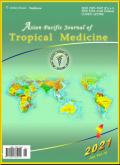Knowledge and associated factors of healthcare workers on measles vaccine and cold chain management at health institutions in Gondar, Ethiopia
IF 1.6
4区 医学
Q3 PUBLIC, ENVIRONMENTAL & OCCUPATIONAL HEALTH
引用次数: 1
Abstract
Objective: To assess the knowledge of healthcare workers on the measles vaccine and its cold chain management. Method: An institutional-based cross-sectional study was conducted from February 1 to March 30, 2022 in Gondar City Administration public health institutions among 165 healthcare workers. Data were collected using a structured questionnaire. In addition, an on-spot observation checklist was used to assess the availability, status and management of the cold chain. A logistic regression model was used to assess the relationship between the outcome and predictor variables. Crude and adjusted odds ratios were calculated with 95% confidence intervals. Results: Overall, 87 (52.7%; 95% Cl 44.8%-60.5%) of the healthcare workers had unsatisfactory knowledge regarding the measles vaccine and its cold chain management. One hundred thirty-six (82.4%) healthcare workers correctly mentioned the recommended range of temperature (2-8 °C) for measles vaccine storage. Healthcare workers aged 18-29 years (P=0.001) and 30-44 years (P=0.014) were observed as determinants of unsatisfactory knowledge on the measles vaccine and its cold chain management. One hundred and five (63.6%) of the healthcare workers did not correctly mention the type of measles vaccine used in routine immunization. More than one-third (36.4%) of the healthcare workers perceived that the measles vaccine is not safe and could cause measles. Conclusions: More than half of the healthcare workers in the study area had unsatisfactory knowledge on the measles vaccine and its cold chain management. It is necessary to provide technical support and in-service training for healthcare workers to ensure optimal immunization effectiveness.埃塞俄比亚贡达尔卫生机构卫生保健工作者对麻疹疫苗和冷链管理的知识及其相关因素
目的:评估医护人员对麻疹疫苗及其冷链管理的认识。方法:2022年2月1日至3月30日,在贡达尔市公共卫生机构对165名医护人员进行了一项基于机构的横断面研究。使用结构化问卷收集数据。此外,还使用了现场观察清单来评估冷链的可用性、状态和管理。使用逻辑回归模型来评估结果与预测变量之间的关系。以95%的置信区间计算粗比值比和调整后的比值比。结果:总体而言,87名(52.7%;95%Cl 44.8%-60.5%)医护人员对麻疹疫苗及其冷链管理的了解不令人满意。136名(82.4%)医护人员正确地提到了麻疹疫苗储存的推荐温度范围(2-8°C)。18-29岁(P=0.001)和30-44岁(P=0.014)的医护人员被视为麻疹疫苗及其冷链管理知识不令人满意的决定因素。105名(63.6%)医护人员没有正确提及常规免疫中使用的麻疹疫苗类型。超过三分之一(36.4%)的医护人员认为麻疹疫苗不安全,可能导致麻疹。结论:研究地区超过一半的医护人员对麻疹疫苗及其冷链管理的了解不令人满意。有必要为医护人员提供技术支持和在职培训,以确保最佳免疫效果。
本文章由计算机程序翻译,如有差异,请以英文原文为准。
求助全文
约1分钟内获得全文
求助全文
来源期刊

Asian Pacific journal of tropical medicine
PUBLIC, ENVIRONMENTAL & OCCUPATIONAL HEALTH-TROPICAL MEDICINE
CiteScore
4.00
自引率
9.70%
发文量
1936
审稿时长
3-8 weeks
期刊介绍:
Asian Pacific Journal of Tropical Medicine (ISSN 1995-7645 CODEN: APJTB6), a publication of Editorial office of Hainan Medical University,is a peer-reviewed print + online Monthly journal. The journal''s full text is available online at http://www.apjtm.org/. The journal allows free access (Open Access) to its contents and permits authors to self-archive final accepted version of the articles on any OAI-compliant institutional / subject-based repository.
APJTM aims to provide an academic communicating platform for international physicians, medical scientists, allied health scientists and public health workers, especially those of the Asia-Pacific region and worldwide on tropical medicine, infectious diseases and public health, and to meet the growing challenges of understanding, preventing and controlling the dramatic global emergence and re-emergence of infectious diseases in the Asia-Pacific.
The journal is proud to have an international and diverse editorial board that will assist and facilitate the publication of articles that reflect a global view on tropical medicine, infectious diseases and public health, as well as emphasizing our focus on supporting the needs of public health practitioners. The APJTM will allow us to seek opportunities to work with others who share our aim, and to enhance our work through partnership, and to uphold the standards of our profession and contribute to its advancement.
 求助内容:
求助内容: 应助结果提醒方式:
应助结果提醒方式:


